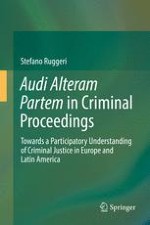2017 | OriginalPaper | Chapter
3. Participatory Rights in Brazilian Law and the Requirements of contradictoire and Full Defence in Criminal Proceedings
Author : Stefano Ruggeri
Published in: Audi Alteram Partem in Criminal Proceedings
Publisher: Springer International Publishing
Activate our intelligent search to find suitable subject content or patents.
Select sections of text to find matching patents with Artificial Intelligence. powered by
Select sections of text to find additional relevant content using AI-assisted search. powered by
